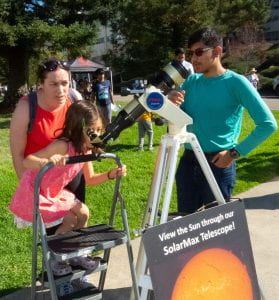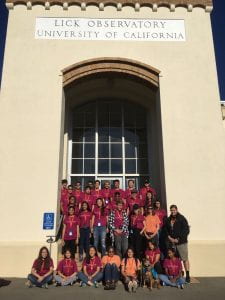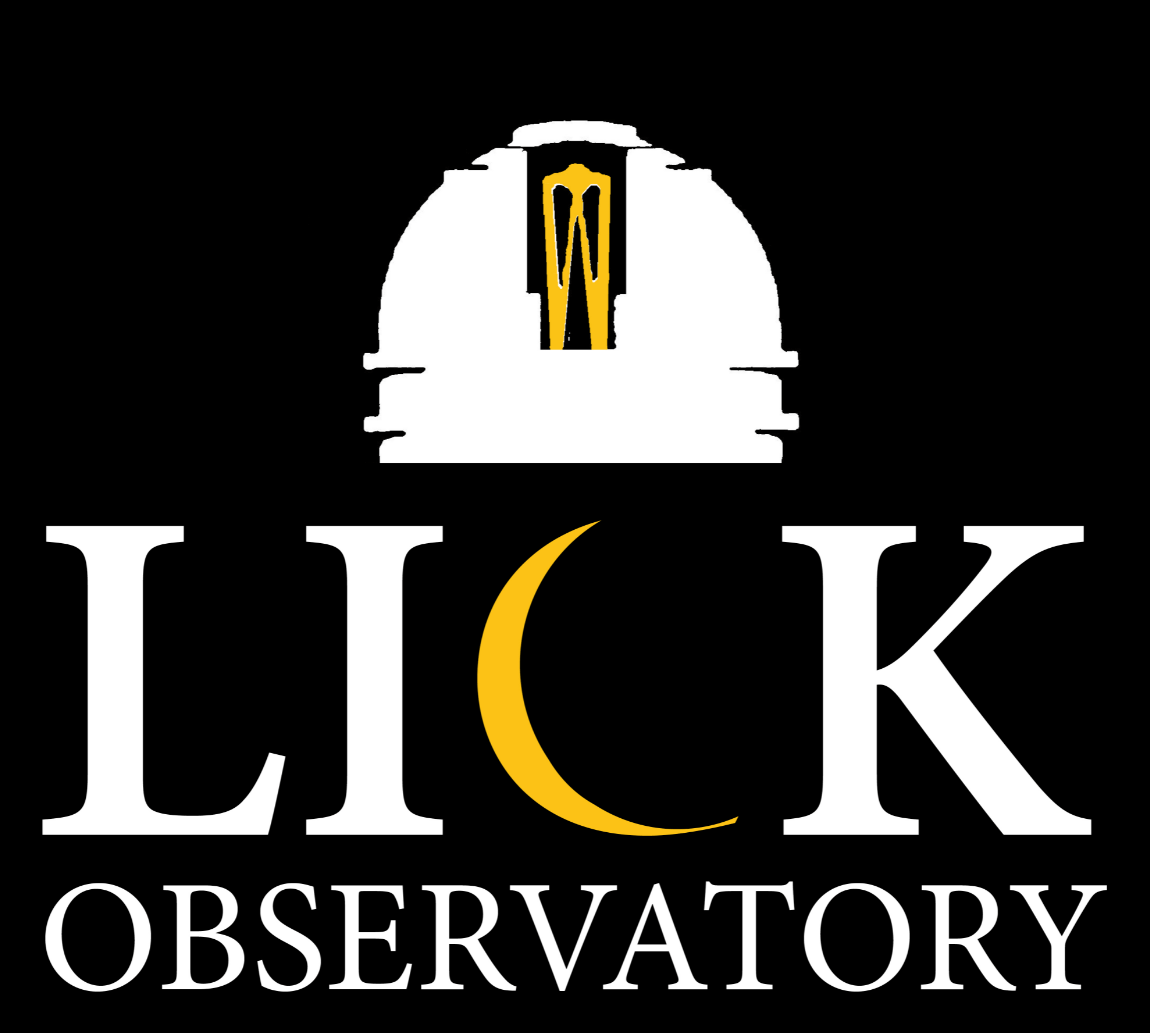Lick Observatory has a visitor center that highlights the astronomical research, science and technology, and history of the Observatory. The visitor center is free of charge for school field trips visiting during the regular open hours. Please email giftshop@ucolick.org to notify us that a school group will be visiting during regular visitor center hours so we can plan accordingly for your group.
Specially scheduled Lick Observatory day or evening tours for school field trips or astronomy/physical science college classes are also available for a fee (note, there is no fee for UC astronomy class tours).
The following programs may be of particular interest to educators.
La Noche de las Estrellas
“La Noche de las Estrellas” is a special Lick Observatory visitors night for the Spanish-speaking community (by invitation only). Lick Observatory hosted approximately 100 high school students and family members from five nearby High Schools (Gonzales, Soledad, Salinas, Castroville, and Watsonville) for the inaugural event on Friday, September 28th, 2017. The students and family members enjoyed a Spanish-speaking evening on Mount Hamilton, featuring short lectures by renowned scientists (e.g., UCSC Astronomy Prof. Enrico Ramirez-Ruiz and Prof. Jesus Gonzales, Director of the Astronomy Institute, National Autonomous University of Mexico), followed by telescope viewings after dark through Lick Observatory’s 36″ Great Refractor and 40″ Nickel telescopes. More smaller telescopes were available outside of the observatory for everyone to look through. The students and their family members also had the opportunity to meet astronomers like Prof. Claire Max (UC Observatories Director), Prof. Emerita Sandra Faber (UCSC and UCO/Lick), Prof. Emeritus David Koo (UCSC and UCO/Lick), Prof. Xavier Prochaska (UCSC and UCO/Lick), and dignities from the Mexican Consulate, among others. Free transportation is a unique feature of the program that is included in order to give access to the program to students from all economic backgrounds. This special event was sponsored and made possible by: The University of California Observatories (UCO), University of California, Santa Cruz MESA (Mathematics, Engineering, Science Achievement), U.S. National Science Foundation, and Friends of Lick Observatory (FoLO).
Solar Telescope School Visits
 Lick Observatory astronomers and volunteers are available to visit schools in the South Bay to do short presentations about the Sun, our nearest star, and show views through our portable solar telescopes. Program works best for a single or few science class rooms 4th through 12th grades.
Lick Observatory astronomers and volunteers are available to visit schools in the South Bay to do short presentations about the Sun, our nearest star, and show views through our portable solar telescopes. Program works best for a single or few science class rooms 4th through 12th grades.
We also have a booth setup with interactive astronomy activities, information about astronomy and Lick Observatory, and solar telescope viewing available for outdoor science fairs and festivals in the San Francisco Bay Area and Santa Cruz region. Recent events have been Science Days at the Giants stadium in San Jose and the Bay Area Science Festival in Hayward.
Email epo@ucolick.org for more information about availability and scheduling.
Resources for Educators and Students
There are many resources available to the public about general astronomy and the tools used to explore the skies, from ground-based telescopes and instruments to space probes. See Astronomy Resources for more information.
COSMOS

COSMOS is a residential summer science program for high school students at UC Irvine, Davis, San Diego, and Santa Cruz campuses. Astronomy clusters may visit Lick Observatory (if their campus is located close enough to Mount Hamilton) for a behind the scenes tour and viewing through the historic 36″ Lick Refractor and/or use the Nickel 1-m telescope to acquire scientific data for their projects.
Lick Observatory Teachers Institute
Lick Observatory hosts the Lick Observatory Teacher Institute (LOTI) in partnership with the Center for Science Education to Multiverse at UC Berkeley’s Space Sciences Laboratory.
The goal of LOTI is to inspire and energize teachers by exposing them to the real process of astronomical research. To do this, LOTI engages northern California middle and high school science teachers in STEM content in multi-day professional development workshops held on site at Lick Observatory. Workshops feature well-vetted classroom activities that have a proven track record in other teacher professional development programs. In addition, there are tours and demonstrations of Lick Observatory’s various research instruments, as well as nighttime observing opportunities. UC scientists participate in the workshops, providing insights for the connections between educational teaching standards and their research.
Lick Observatory offers a unique setting for teacher professional development: the Observatory and Visitor Center on Mount Hamilton, just 20 miles east of San Jose, California. Tours of the telescopes, discussions with the research astrophysicists in residence, and nighttime observations are an integral part of the LOTI experience. Not only do participants do inquiry-based activities aligned with Common Core and Next Generation Science Standards, they practice new astronomy skills under the observatory’s dark skies, weather permitting, and partner with trained and nationally recognized astronomy educators.
Benefits
The benefits of the LOTI program include:
- Inquiry-based activities that are Common Core and Next Generation Science Standards-aligned
- Immersion: Three days and two nights at the observatory
- Meet astronomers and discuss current astronomical research
- Meet and network with colleagues
- Practice basic astronomy skills
Recommended for middle school, high school, and lower division undergraduate school instructors.
The next workshop has not yet been funded or scheduled.
Graduate Student Workshop
Each fall since 2013 Lick Observatory provides a several day workshop on observational astronomy for graduate students across the UC system.
The workshop is run by the Lick Observatory Staff Astronomers, featuring observing experience with the Kast spectrograph on the Shane telescope, the Hamilton spectrograph on the Coude Auxiliary Telescope (CAT), and direct imaging with the Nickel 1-m reflector. Additionally, the Workshop promises introductory lectures, interactive observation planning sessions, rewarding experiences as well as valuable networking opportunities embracing the whole of UC Astronomy.
This workshop is made possible thanks to a donation from UC Irvine astronomy professor, Virginia Trimble. Please see the Grad Workshop web pages.
